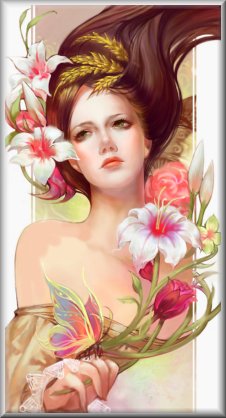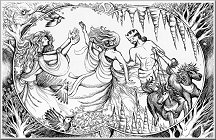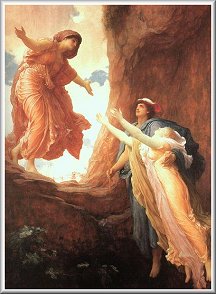
PERSEPHONE
CLICK TO ENLARGE

DEMETER
CLICK TO ENLARGE

DEMETER & PERSEPHONE
CLICK TO ENLARGE
|
DEMETER PAGE TWO
Demeter’s tragic story is her search for Persephone (Kore),
Demeter’s only child from her union with Zeus, the King of the
Olympians.
Persephone grew up happy, playing with Artemis and Athena, the
other children of Zeus, but one day her uncle, Hades, fell
desperately in love with her.
One morning, while she was picking flowers in a meadow along
with her girlfriends, the earth opened wide and Hades appeared,
riding an awesome chariot that was pulled by four black horses.
Persephone was abducted by Hades and dragged down to the
Underworld with him. Hearing her daughter's screams, Demeter
rushed to her aid but wasn't able to find her. She had
disappeared under the earth, but her mother didn't know this.
Heartbroken, Demeter searched the entire earth without stopping
to eat, drink or take care of herself. Disillusioned once she
discovered the identity of the abductor she decided to leave
Olympus and renounce her divine duties until Persephone was
returned to her.
Demeter's self-imposed exile caused the earth to go barren and
Zeus, who was responsible for maintaining order in the world,
finally commanded his brother Hades to give back Persephone.
Because she had eaten seven seeds from a pomegranate while in
the Underworld, however, Persephone was bound to remain there.
An arrangement was eventually worked out and Demeter's daughter
later returned to earth with the condition that she spends four
months of each year with Hades.
In these months Demeter misses her daughter so much that she
withdraws her gifts from the earth, and winter comes. But when
her daughter returns, Demeter is so happy that she restores all
her gifts and spring starts.
The epic poet Homer claims that the goddess Hecate was an
assistant to Demeter while she searched for her daughter and
afterwards she became Persephone's attendant in the Underworld.
During the search for her daughter Demeter had visited the city
of Eleusis and taken a job as a nurse to a royal family. She
took care of the infant, a mortal named Triptolemus, using her
powers in an attempt to make the boy immortal. When he grew
older Demeter gave Triptolemus a chariot of winged Dragons and
bushels of wheat with which, flying through the sky, he sowed
the whole inhabited earth.
She was known as a kind goddess and not usually vindictive, but
to punish the Sirens for not coming to the assistance of her
daughter when she was being kidnapped, Demeter transformed them
into flying creatures, the scourge of ancient sailors.
Another time, while looking for her daughter, Demeter came to
the region of Attica. She was very thirsty, for she had been
traveling far and wide, and was relieved to see a spring with
cool clear water.
As she thirstily lapped the refreshing water, she was startled
to hear a man named Ascalabus, laughing at her because of her
way of drinking. Embarrassed at this, distraught at the loss of
her daughter, and angry at Ascalabus for being so rude, Demeter
turned him into a gecko, which is a small insect-eating lizard.
There was another instance where the goddess proved to be cruel:
A mortal named Erysichthon cut down an oak tree sacred to
Demeter. In order to punish this profane act, the goddess sent
endless famine to the poor man. As much as Erysichthon ate, so
much he desired again. There was no satisfying him, and he ate
constantly until at the end he ate himself and died.
Either to test Zeus' ability to know all, or simply to show what
a good host he was, a man named Tantalus slaughtered his own
son, Pelops, cut him up, boiled the pieces and offered them as a
meal at a feast of the gods. Of all the gods only Demeter
unknowingly ate his arm, but when this outrage was discovered he
was given life again by the will of the gods. His limbs were
joined together but the shoulder was not complete, so Demeter
fitted an ivory one in its place.
The myth of Demeter and her daughter embodies the idea that the
productive powers of the earth or nature come to rest, or are
concealed during the winter season.
The goddess (Demeter and Persephone, also called Cora or Kore,
are here identified) then rules in the depth of the earth
mournful, but striving upwards to the all-animating light.
Persephone, who has eaten of the pomegranate, is the fructified
flower that returns in spring, dwells in the region of light
during a portion of the year, and nourishes men and animals with
her fruits.
DEMETER CONTINUES ON
PAGE THREE
LOTS MORE STORIES AND A TON OF PIX
CLICK HERE!

[home][page
one][page two][page
three]
|







